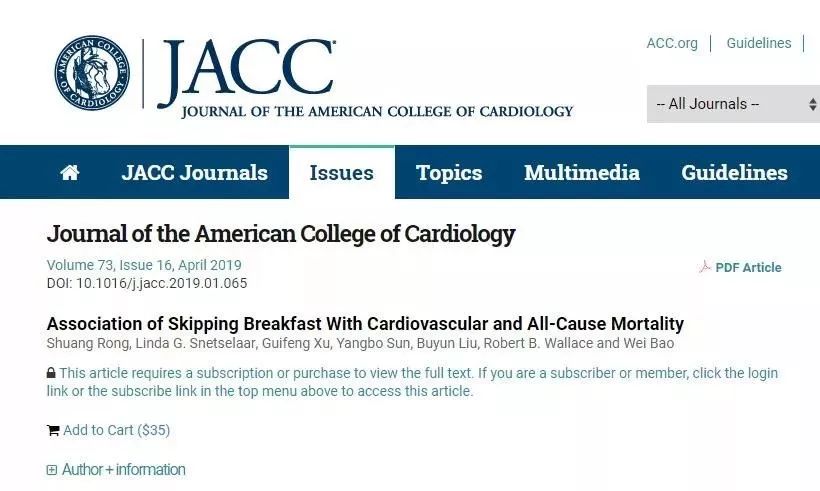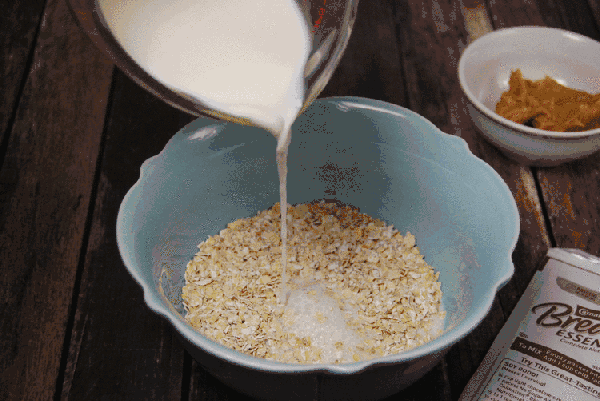
A good breakfast can light up the day. But the reality is that many people would rather spend time lying in bed and grooming carefully than taking ten minutes to eat breakfast seriously.

The White-collar Breakfast Report released by an organization at the end of 2020 shows that the proportion of people who never eat breakfast has reached 10.37%, and 1 in 10 people is “insulated” from breakfast completely.

A number of studies have confirmed that skipping breakfast has adverse effects on health:
Research from the University of Tokyo in Japan shows that people who have no time or are not used to eating breakfast are more likely to experience negative emotions such as anxiety and depression.
A study by the University of Leeds in the United Kingdom shows that students who barely eat breakfast have an average score of 10.25 points lower than those who eat breakfast regularly, a difference of nearly two grades.
The Journal of the American College of Cardiology gives you a new reason to eat breakfast: skipping breakfast often can damage the cardiovascular system and may also lose life.

Without breakfast, the risk of cardiovascular disease is 80% higher
An article published by the Journal of the American College of Cardiology JACC uses scientific data to prove the relationship between breakfast and cardiovascular disease.

The study followed 6550 American adults between the ages of 40 and 75 for 18.8 years.
Among these study subjects, 5.1% never eat breakfast, 10.9% eat it rarely, 25% eat it sometimes, and the remaining 59% eat breakfast every day.
The results showed that compared with those who ate breakfast every day, those who never ate breakfast had an approximately 87% higher risk of cardiovascular death and an approximately 19% increase in total mortality risk.
Why not eat breakfast is a high risk of cardiovascular disease?
Skipping breakfast can lead to many cardiovascular risk factors, such as obesity, hypertension, dyslipidemia, elevated blood sugar, and metabolic syndrome. These can explain why skipping breakfast increases the risk of death.
Cardiovascular disease is the number one cause of death in the world. The researcher said: “Eating breakfast is an important and easy way to promote cardiovascular health and prevent cardiovascular morbidity and mortality.”
In addition to injury to blood vessels, skipping breakfast invites 5 diseases

If you don’t eat breakfast for a long time, all kinds of diseases will come uninvited:
01. Gastritis, gastric ulcer
The hazard of skipping breakfast to the digestive system ranks first.
Under normal circumstances, the food eaten the night before will be emptied from the stomach into the intestine after about 6 hours. If breakfast is not good the next day, stomach acid and various digestive enzymes in the stomach will “digest” the gastric mucosa.
If things go on like this, the normal function of cells to secrete mucus will be destroyed, which can easily cause digestive diseases such as gastric ulcer and duodenal ulcer.
02. Hypoglycemia
After a night of digestion, the food has been exhausted and the blood sugar index is low in the morning.
If you do not eat breakfast to replenish blood sugar, the body will use stored muscle glycogen and liver glycogen, which will burden the muscles and liver. The typical manifestation is weakness of the limbs.
In addition, when the blood sugar supply is insufficient for some people, the energy of the heart and brain cells that use glucose as an energy source will be insufficient, and people will experience fatigue, fainting, etc., which will seriously damage the brain and heart.
03. Weight gain
A survey published by the British Daily Mail showed that people who skip breakfast may gain 26 pounds (about 22 kg) a year.
Eating a lot of breakfast will increase the body’s energy consumption, produce a stronger sense of fullness, reduce the craving for sweets, and overall healthier.
04. Increase the risk of gallstones
When on an empty stomach, bile tends to accumulate, which may cause stone symptoms. Those who have a diet preference for meat and sweets also tend to form gallstones due to their intake of fat and cholesterol.
Too much sweets will promote insulin secretion, accelerate the deposition of cholesterol in the bile, and form gallstones.
05. Irregular menstruation, pelvic inflammatory disease
Skipping breakfast will tighten the blood vessels in the pelvic cavity and cause ovarian dysfunction, leading to low menstrual flow, menstrual imbalance, and even amenorrhea.
A qualified nutritious breakfast looks like this
Breakfast must not only be eaten, but also delicious to ensure the vitality of the day.
Eating breakfast too late will delay the metabolic function of the body. It is recommended to eat breakfast within 1 hour after waking up, preferably within 15 minutes.
A perfect breakfast full of energy needs to include the following types of food.

1. Carbohydrate; 2. Protein; 3. Lecithin; 4. Vitamins and minerals.
According to the above principles, two vitality breakfasts are recommended:
1 cup of milk + 1 egg + 2 slices of whole wheat bread + 1 tomato.
1 cup of soy milk + 1 biscuits with beef lettuce + 1 handful of nuts (walnuts, pine nuts, etc.).
Carbohydrate-rich foods
Various staple foods such as bread, steamed buns, and porridge. Carbohydrates can be directly converted into the “fuel” necessary for the brain-glucose, which supports the brain to do everything, such as thinking, memory, and problem solving.

When the supply of glucose is sufficient, brain cells become active.
It is best to add coarse grains such as oats and sweet potatoes to breakfast. While they continue to provide blood sugar, they can also provide B vitamins, which is conducive to brain energy metabolism.
Foods rich in protein
Meat, fish, milk, etc. It can keep blood sugar stable after rising slowly. The tyrosine in protein can also promote the body to secrete dopamine and adrenaline, which makes people think sharper and improve work efficiency.
The ratio of protein in traditional Chinese breakfast is low, and high-protein foods should be consciously increased.
Foods rich in lecithin
Eggs, soy products, etc. Lecithin is digested and absorbed to release choline, and then synthesize the neurotransmitter acetylcholine, which can promote and improve the function of the nervous system.
Foods rich in vitamins and minerals
Such as fresh fruits and vegetables. Vitamins and minerals are essential “building materials” for the brain. Phytochemicals can fight against the damage of free radicals to the brain and protect memory.
3 kinds of food should be included in the “blacklist”
Some people are not healthy enough even if they eat breakfast. The following 3 types of foods, cross them out of your breakfast recipe as soon as possible.
01. Fried food
Fried foods such as deep-fried dough sticks and fried cakes are high in calories and contain high levels of fat and oxidizing substances, which may increase the risk of obesity. Grilled and smoked food, especially meat, such as bacon, smoked sausage, etc., may produce carcinogens.
02. High salt food
Pickled vegetables, pickles, mustard, pickles and other foods have low nutritional value. They stimulate the taste buds and also contain a lot of salt, which is not only bad for blood pressure control, but also easily causes calcium loss.
03. High sugar drinks
Fruit and vegetable beverages, milk beverages, yogurt beverages and other beverages taste good. Most of them are prepared from sugar, flavors and other food additives. The content of real vegetables, fruits and milk is very small.
Eating breakfast every day is a healthy lifestyle advocated by the World Health Organization. No time, no appetite, and weight control should not be excuses.
It is recommended that you cultivate the habit of eating breakfast and set aside a fixed breakfast time every day. Parents’ words and deeds and the mutual influence of family members are equally important!
Comments